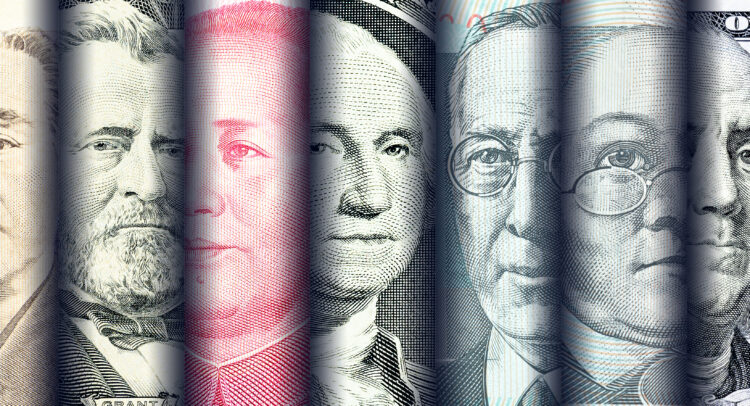The U.S. dollar (DXY) has long held the coveted position of the world’s reserve currency, symbolizing trust and dominance in international trade and finance. However, in a competitive world, challengers have emerged. These include the Euro (USD-EUR) and the collective efforts of the BRICS nations (Brazil, Russia, India, China, South Africa, Iran, Egypt, Ethiopia, and the United Arab Emirates) aiming to dethrone the greenback. But a recent report by the Atlantic Council’s GeoEconomics Center scorns the idea of any real headway by competitors. At the most basic level, it highlights the dollar’s continued strength and global acceptance.
Discover the Best Stocks and Maximize Your Portfolio:
- See what stocks are receiving strong buy ratings from top-rated analysts.
- Filter, analyze, and streamline your search for investment opportunities with TipRanks’ Stock Screener.
Dollar Dominance Metrics
The report, aptly named the Dollar Dominance Monitor, clearly states that the dollar maintains its supremacy across all key metrics. It remains the go-to currency for foreign reserve holdings, the preferred medium for international trade invoicing, and the dominant player in global currency transactions. This dominance translates into stability and security for investors, which can be worrisome with other mediums of exchange in a consistently uncertain and sometimes volatile world.
The American Advantage
Several advantages contribute to the dollar’s enduring strength. At the top of the list is the U.S. economic machine, with its consistent growth and relative stability providing a solid foundation for the currency’s value. Additionally, the Federal Reserve’s recent tightening of monetary policy has further bolstered the dollar’s appeal, according to this report.
Geopolitical strife and upheaval in parts of the globe also play a role. As uncertainty rises, investors seek havens, and the dollar, backed by the world’s strongest military and a stable political system, remains an attractive option.
BRICS’ High Ambition, Limited Results
The BRICS nations, with their combined economic might, represent a potential challenger to dollar dominance. However, their efforts to de-dollarize the global system have yielded limited results. While China’s Cross-Border Interbank Payment System (CIPS) has seen an increase in participants, it remains dwarfed by the established SWIFT network. Talks of a unified BRICS payment system are in their early stages, and bilateral agreements, though promising, lack the scalability to truly compete with the dollar.
China’s Renminbi Gamble
China, the economic powerhouse of the BRICS group, has actively promoted the renminbi as a reserve currency. However, the Dollar Dominance Monitor report highlights unexpected trends. The renminbi’s share in global reserves has actually declined, likely due to anxieties surrounding China’s economic outlook, its stance on the Russia-Ukraine war, and potential geopolitical tensions around Taiwan. These factors raise questions about the renminbi’s stability and make investors wary of its suitability as a reserve currency.
The Euro’s Struggle: A Fading Dream
The Euro, once envisioned as a rival to the dollar, has also lost its luster. The war in Ukraine exposed the Euro’s vulnerability to geopolitical disarray. Additionally, concerns regarding Europe’s economic stability, fiscal consolidation efforts, and the lack of a unified capital market weaken the Euro’s appeal among international options. Furthermore, investors have increasingly turned to gold as a safe-haven asset, further weakening the Euro’s viability.
Key Takeaway
Despite the emergence of potential challengers, the U.S. dollar remains firmly entrenched as the world’s reserve currency. Its dominance is supported by a robust economy, proactive monetary policy, and a stable political system. While alternative currencies like the renminbi and the Euro have shown aspirations of increasing their global influence, they face significant hurdles, including geopolitical uncertainties and a lack of financial infrastructure. According to the Dollar Dominance Monitor, investors seeking stability and security will likely continue to favor the dollar for the foreseeable future.









